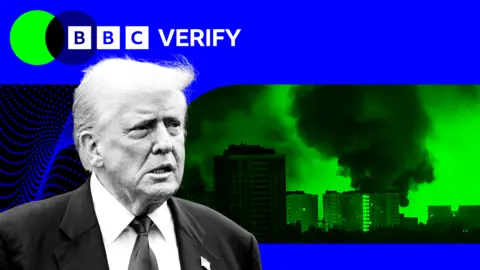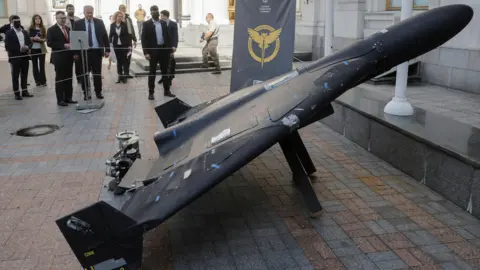BBC Verify
 Reuters
ReutersRussia has more than doubled the number of drones and missiles fired towards Ukraine since President Donald Trump returned to the White House in January, a BBC Verify analysis has found, despite his calls for a ceasefire.
Attacks had already been rising under former President Joe Biden in 2024 but climbed sharply after Trump’s election victory in November. Since he returned to office in January, recorded aerial attacks from Moscow have reached their highest levels of the war.
Throughout his campaign Trump vowed to bring an end to fighting in just one day if returned to office. He claimed during his 2024 campaign that Russia’s full-scale invasion of Ukraine could have been averted had a president who the Kremlin “respected” held office.
However, in his efforts to achieve a ceasefire he has been accused at times of favouring Russia by critics, and his administration has paused deliveries of air defence munitions and other military supplies to Ukraine on two separate occasions.
The pauses – announced in March and July and since reversed by the president – came as Russia steadily increased missile and drone production. According to Ukrainian military intelligence, ballistic missile construction in Russia grew by 66% over the past year.
The data reviewed by BBC Verify – based on daily incident reports issued by the Ukrainian Air Force – showed that Russia launched 27,158 munitions between 20 January – when Trump’s presidency began – and 19 July, compared with 11,614 over the final six months of Biden’s term.
“This brutal war was brought on by Joe Biden’s incompetence, and it has gone on for far too long,” White House deputy Press Secretary Anna Kelly said in a statement to BBC Verify.
“President Trump wants to stop the killing, which is why he is selling American-made weapons to Nato members and threatening Putin with biting tariffs and sanctions if he does not agree to a ceasefire.”
In the opening weeks of the new administration, the White House issued a series of warm statements seemingly intended to entice President Vladimir Putin towards a settlement. During this period, Russian attacks on Ukraine briefly fell when compared with the final weeks of the Biden administration.
But by February, when US diplomats led by Secretary of State Marco Rubio met Russian Foreign Minister Sergei Lavrov’s delegation for a summit in Riyadh, attacks had started to climb again.
The talks, which Rubio said were a starting point to bring an end to the war, have been followed by mediated discussions between Ukrainian and Russian officials in Turkey.
Attacks peaked early last month, when Moscow launched 748 drones and missiles towards Ukraine on 9 July, according to the Ukrainian Air Force data. More than a dozen people were reportedly injured by the barrage and two were killed.
While Trump has expressed anger at the escalating Russian attacks on several occasions, his mounting frustration does not appear to have had an impact on Moscow’s strategy.
On 25 May, Russia launched its then-largest recorded barrage, prompting Trump to angrily ask: “What the hell happened to him [Putin]?”
Since then, Russia has exceeded that number of reported launches on 14 occasions. Trump has responded by demanding that the Kremlin reach a peace deal with Ukraine by 8 August.
The number of Russian munitions penetrating Ukrainian air defences appears to be increasing, with explosions around the capital Kyiv becoming a daily part of life for residents of the city.
“Every time you go to sleep, you don’t know if you’re going to wake up the next morning, and that’s just not a normal way to live,” Dasha Volk, a journalist living in the city, told the BBC’s Ukrainecast programme in June.
“Every time you hear an explosion or a missile flying over your head, lots of thoughts are going through my mind – I’m going to die now, things like that.”
Ukraine ‘vulnerable’ to aerial attacks
Senator Chris Coons, a senior Democrat on the US Senate Foreign Relations Committee, told BBC Verify that Trump’s decision to suspend weapons supplies on two occasions and his broader approach to Russian relations may have convinced the Kremlin that it had the freedom to increase attacks.
“It’s clear Putin feels emboldened by Trump’s weakness and has increased his vicious assault on the Ukrainian people, repeatedly attacking hospitals and maternity wards, the Ukrainian power grid, and other civilian sites,” he said.
The growing attacks have renewed calls for the US to send fresh supplies of Patriot anti-air batteries to Ukraine. The Patriots are the most capable and expensive air defence systems that Ukraine has. Each Patriot battery costs around $1bn (£800m), and each missile costs nearly $4m.
Trump has overturned the previous supply pauses and agreed to sell weapons to Nato members, who will in turn supply them to Kyiv. Trump appeared to imply that the deal would include fresh supplies of Patriot batteries.
Justin Bronk, an analyst focussing on the Russian military at the Royal United Services Institute (RUSI), said restrictions on the supply of military equipment imposed by the White House had made Ukraine “vulnerable” to missile and drone attacks.
But he also noted that Russia has ramped up the production of missiles and so-called ‘kamikaze’ drones such as the Geran-2 – a domestically produced version of the Iranian Shahed drone. Mr Bronk said that Russia’s increased stockpiles, coupled with “significant reductions” in supply of US interceptor missiles had encouraged Moscow to escalate its air campaign.
 EPA
EPAUkraine’s Military Intelligence agency (HUR) recently told domestic media that Russia was now producing up to 85 ballistic missiles per month, up from 44 in April 2024.
Russia is reportedly producing 170 Geran drones per day, having established a massive manufacturing facility at Alabuga in the south of the country.
In a recent interview with Russian military TV, the facility’s director Timur Shagivaleyev boasted that Alabuga had become “the largest combat drone production plant in the world”, adding that his workers were producing nine times more units than initially expected.
Satellite images show the facility has expanded significantly since mid-2024, with a number of new warehouses built on the site.
Other structures, including what appear to be expansions to worker dormitories, remain under construction.
Senator Coons warned that the increase in production meant that Washington must make clear that it is not preparing to walk away from the conflict as some administration officials have threatened he could do, emphasising that peace can only be achieved through “surging security assistance”.
He added that President Trump must make it clear to Russia that it “cannot simply try to outlast the West”.
“In order to do that, he needs to maintain a consistent and sustained position on the war.”
Meanwhile, Ms Volk said that every day the Russian campaign drags on and Ukrainian interceptions fall public morale is hammered.
“People are getting tired because of these attacks, they really affect our lives,” she said.
“We know what we are fighting for, but it becomes more difficult every year because everyone is getting exhausted. That’s the reality.”





